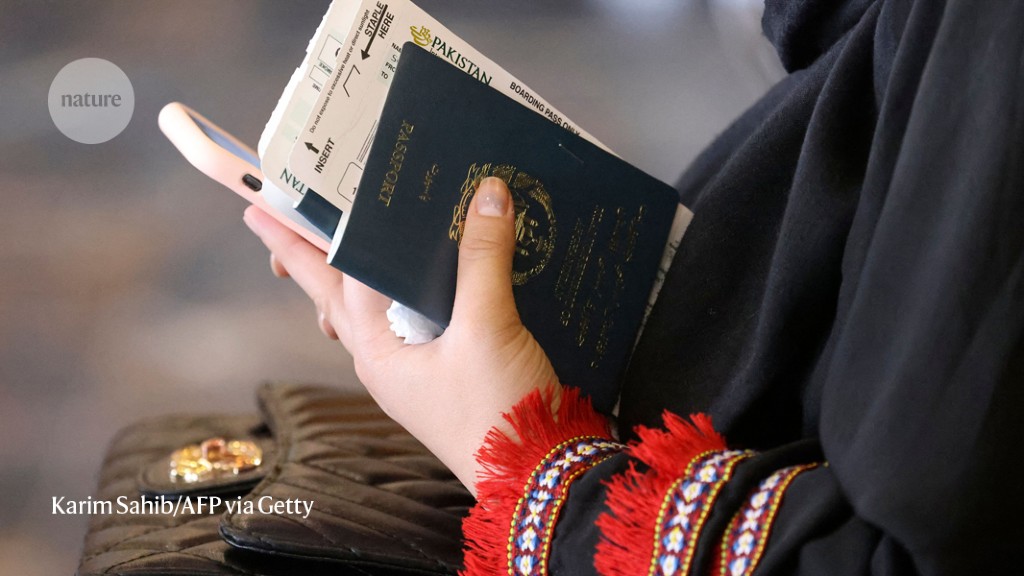The United Kingdom needs to welcome international researchers to thrive

Scientific strength does not come from severing long-standing relationships or turning away talent from around the world

Afghanistan is one of more than ten countries from which more than half of applicants were refused a visitor’s visa to the United Kingdom in 2022.Credit: Karim Sahib/AFP via Getty
Science has long transcended geographical borders. Collaborative relationships formed when scientists from different countries are free to travel and work together are at the heart of today’s research teams. As the innovation specialist Charles Leadbeater wrote 15 years ago in a monograph called ‘The Difference Dividend’, innovation thrives when people are allowed to work freely across borders and cultures (go.nature.com/3oqq6xx).
Yet some research-intensive nations are now erecting barriers. China and the United States are dismantling two decades of research cooperation that has benefited both nations. Opportunities for collaboration are also diminishing elsewhere. The necessity of obtaining a visa means that it has never been easy for researchers in low- and middle-income countries (LMICs) to collaborate with colleagues in high-income countries. Earlier this month, seismologist Sujania Talavera-Soza plotted the likelihood of a passport holder needing a visa to study or work abroad against their country’s gross domestic product (see ‘Not all passports are created equal’). She concluded that people in the poorest countries almost always need visas (S. Talavera-Soza Nature Geosci. 16, 550–551; 2023). These are getting increasingly difficult to come by.
Source: S. Talavera-Soza Nature Geosci. 16, 550–551 (2023).
For some time, UK universities have been reporting that researchers whom they invite to attend conferences, give talks or receive awards struggle to get visas. In one instance, an event on science in LMICs had few speakers from these countries because most of those invited had their visa applications refused.
The Royal Society, the country’s national science academy, has been investigating researchers’ experiences of UK visa applications, and last week published its findings (see go.nature.com/3pv6kpw). The report reveals that, out of ten countries classed as leading science nations by Nature Index 2022 for which data are available, the United Kingdom is third, after Sweden and France, for rejecting business visa applications. In 2022, the ten countries from which the greatest proportion of people were refused a standard visitor visa — which allows individuals to come to the United Kingdom for up to six months for business or study — were all in Africa. More than 50% of applicants from these countries were turned down. This is shocking and unacceptable.
The Royal Society is recommending that the UK government create a special short-term researcher-mobility visa; it also says communication with visa applicants should be clearer. That should apply to all applicants, not just scientists. Everyone deserves to be treated fairly.
Going backwards
The society is also among many concerned that there is still no agreement on whether UK scientists will be allowed to participate fully in the European Union’s Horizon Europe research programme. A decision on whether to join the 95.5-billion (US$106-billion) project is understood to have been postponed until after the summer. Scientists are aghast. The government’s former chief scientific adviser, Patrick Vallance, said last week that joining needed to have happened “yesterday”. There is a risk it won’t happen at all.
The delay is down to disagreement over how much the United Kingdom should pay to join the project, and what should happen if its researchers end up winning more or less in grants than the nation pays in. The problem with a prolonged delay is that the Horizon project is time-limited — it started in 2021 and will run until the end of 2027. The United Kingdom has already lost two years, and researchers fear that if two becomes three, there might not be enough time left to run some projects. In case the Horizon bid fails, UK policymakers have a plan B that they are calling Pioneer: this would involve a new set of funding schemes for the United Kingdom and other nations. But Pioneer is untested and has few fans in the research world.
UK membership of EU science agreements goes back decades, and the disruption caused by Brexit has been damaging. UK negotiators need to ask themselves whether a prolonged argument is worth derailing an entire scheme from which the country, its researchers and the course of discovery, innovation and invention will all benefit.
Whether the UK government decides that the nation’s future lies with Pioneer or Horizon, it urgently needs to change its closed-door attitude towards scientists from LMICs who apply to visit for academic purposes. UK leaders are fond of describing the country as a science superpower. Stopping researchers from African countries visiting, and allowing continued delays to prevent the nation from joining the world’s largest international collaboration scheme, undermine that ambition.
Nature 619, 672 (2023)
doi: https://doi.org/10.1038/d41586-023-02367-1
This story originally appeared on: Nature - Author:furtherReadingSection


















